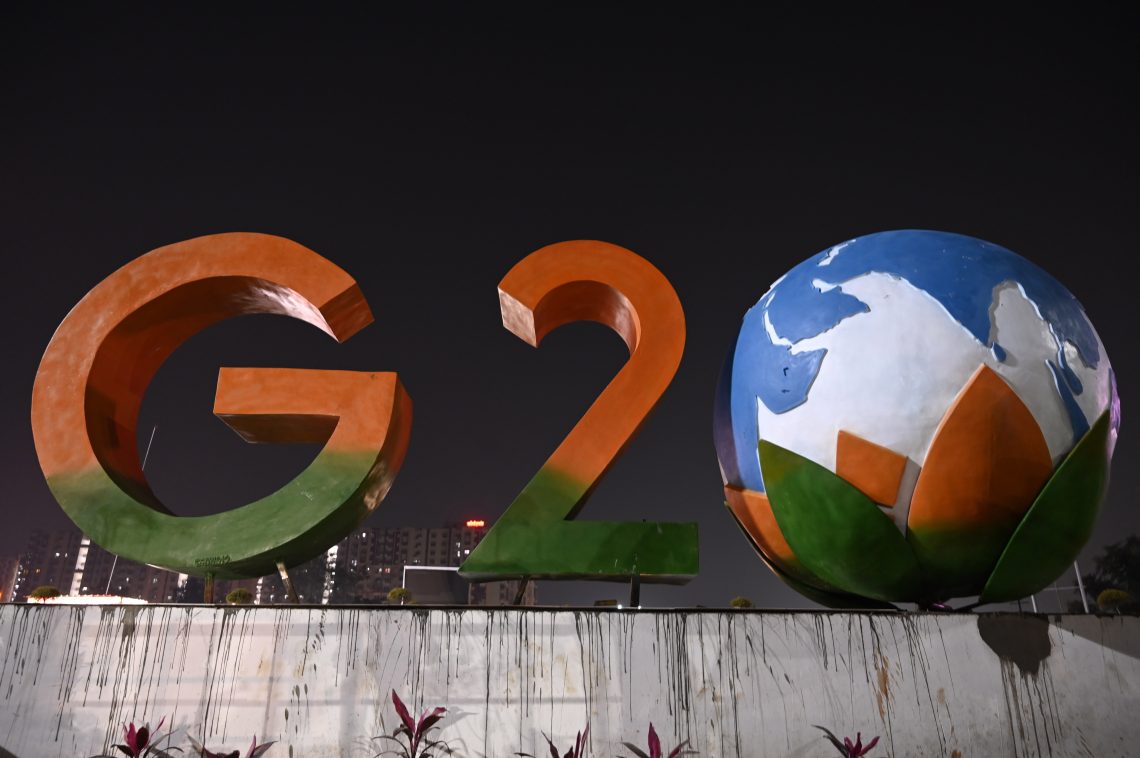What role should the G20 play?
The Group of 20 nations is less bureaucratic than most international organizations, but conflicting interests among members could doom its ability to act.

In a nutshell
- The G20 got off to a successful start in confronting the 1999 and 2008 financial crises
- Its agenda has grown unwieldy and its ability to spur joint action is doubtful
- The members will need to resolve internal disputes to reclaim the mantle of success
Hundreds of regional and global international organizations have been established to address a multitude of issues. Some focus on resolving political disputes or bolstering collective security. Others set international rules and technical standards or try to promote economic development. And the list goes on.
Understanding what each organization does and how they interact is extremely confusing, made more so by the fact that their missions and mandates frequently overlap. A lack of creativity in naming does not help, either. One can be forgiven for not knowing what distinguishes the Group of 20 (G20) from the Group of Seven (G7), Group of 15 (G15), Group of 24 (G24), Group of 77 (G77), or any other “group” of nations.
Nevertheless, the G20 stands out. It became one of the most prominent international forums following its central role in coordinating the international response to the 2008 global financial crisis. Since then, however, its star has dimmed by inaction and, particularly in recent years, dissension among the members, whose geopolitical rivalries undermine the cooperative spirit that the body requires to function.
What is the G20?
The G20 was established in 1999 after the Asian financial crisis and other debt crises in developing countries roiled international financial markets. Focusing on international economic matters, it was set up to convene finance ministers and central bank governors (or their equivalents) from major developed and developing economies to discuss current and looming economic concerns and propose joint action to bolster financial stability.
Since its creation, the G20 has comprised the European Union and 19 individual countries: Argentina, Australia, Brazil, Canada, China, France, Germany, India, Indonesia, Italy, Japan, the Republic of Korea, Mexico, Russia, Saudi Arabia, South Africa, Turkey, the United Kingdom and the United States. Spain is invited as a permanent guest. In addition, there are standing invitations for major international organizations to participate, albeit not as formal members. Among those organizations are the United Nations, the World Bank, the International Monetary Fund and the World Trade Organization.
Unlike most international organizations, the G20 has no permanent headquarters, staff or secretariat.
Because the impetus for establishing the G20 was to confront a financial crisis, a key requisite for membership was economic size and influence within the global economy. Since its founding, G20 nations have comprised roughly 80 percent of global gross domestic product (GDP). Currently, the EU and G20 nations comprise “around 85 percent of the global GDP, over 75 percent of the global trade and about two-thirds of the world population.”
The G20 grew dramatically in stature when it led the international response to the 2008 financial crisis. Because of the magnitude of the crisis, participation was elevated above finance ministers and central bankers including heads of state and heads of government. With heads of government participating, the “meeting” became a “summit” event, and the agenda quickly expanded beyond trade, debt and international financial stability to include diplomatic initiatives, international health, climate and other matters beyond the group’s original economic focus.
The G20’s response to the 2008 crisis was widely lauded as helping mitigate economic harm, leading some to observe that “the G20 has become the most important forum of global governance and cooperation, largely replacing the once powerful G7.” Nevertheless, the G20 has not since lived up to these high expectations. In fact, observers were raising doubts about the group only a few years after it earned great praise in 2008.
Read more by Brett Schaefer
A narrow path to reforming the UN Security Council
How does the G20 work?
Unlike most international organizations, the G20 has no permanent headquarters, staff or secretariat. The presidency rotates annually among the member states. The responsible nation proposes an agenda and sets up the support structure and staff to coordinate and organize the meetings for that year’s summit. For continuity, current presidents are assisted by their immediate predecessors and successors. This “troika” helps ensure smooth transitions from one summit to the next.
In addition, the G20 has two “tracks” to document and follow up on commitments from previous summits. The Sherpa Track, led by representatives of the member states, focuses on noneconomic issues, while the Finance Track, led by the finance ministries and central banks of the member countries, focuses on economic and financial issues. The G20 also includes Engagement Groups to assist nongovernmental participation.
International organizations have a well-earned reputation for ineffectiveness and sluggishness.
Unlike many international organizations, the G20 does not adopt binding agreements or resolutions. Instead, the G20 issues communiques from ministerial meetings leading up to the summit and a “Leaders Declaration” at the conclusion of the summit summarizing the discussions and matters agreed to by the participants. Implementation depends on the subsequent actions of the individual states.
Will G20 become like other the international organizations?
International organizations have a well-earned reputation for ineffectiveness and sluggishness. One has only to look at the United Nations, where the lowest common denominator outcomes are the most likely – if an outcome is possible at all. The inability of the UN to act decisively in response to Russia’s invasion of Ukraine is a case in point.
The G20, supposedly, is different. With members from all regions of the world, including both developed and developing countries, the G20 is more representative and reflective of global power dynamics than the Group of 7, which consists of the U.S., Japan, France, Germany, Italy, Canada and the UK. With only 20 members and without a permanent bureaucracy, the G20 is theoretically more nimble than international organizations like the UN and can adapt to address pressing concerns.
Its reputation for effectiveness rests largely on its crisis management role in 2008 and 2009, when it advocated increasing IMF resources, endorsed financial accounting and regulatory reforms, and recommended “fiscal expansion” to boost growth. However, post-crisis analysis indicates that these actions were not without lasting negative side effects, such as the accumulation of public debt. In addition, there is reason to wonder if the G20 was instrumental in adopting these policies or simply the most convenient venue to espouse them. In other words, to quote one observer: “Did the joint G20 statements … provide vital reassurance and policy coordination to the great powers, or are they simply epiphenomenal to a harmony of preferences?”
Indeed, it is an open question whether the G20 is really all that different from other forums. Consensus actions by the G20, if followed through on, can have a substantial impact. However, nations often fail to honor their pledges. Researchers at the University of Toronto have estimated that, on average, G20 members comply with commitments only about 70 percent of the time. For example, financing for international health in response to the Covid-19 pandemic fell far short of G20 pledges, and not a single G20 member is on target to meet its emissions reductions or climate finance pledges – a central tenet of multiple G20 summits. Reviewing past G20 summits, you see commitments made over and over, indicating that they remain unfulfilled. It is easy to understand why some see the G20 less as an effective, outcome-oriented forum, and more as an opportunity to posture and make empty promises.
Unsurprisingly, the G20 has been criticized for division and inaction. A few years ago, tensions arising from Russia’s 2014 invasion of Ukraine fractured consensus. Under President Donald Trump, U.S. resistance to climate change language scuttled an agreement on that issue.

These problems are likely to get worse, not better
Rising geopolitical tensions among China, Europe, Russia and the U.S. threaten to derail the G20 – and to be fair, other international organizations. In 2022, the G20 was not able to agree on joint communiques prior to the summit, raising concerns that a Leaders Declaration might not be issued in 2022. In the end, there was indeed a 2022 G20 Leaders Declaration. However, the G20 was not able to agree to consensus language on the most pressing issue of the day: Russia’s invasion of Ukraine.
Further, the temptation to lard up the agenda is hard to resist, as each host government tries to put its stamp on the G20 agenda. According to researchers at the University of Toronto, G20 commitments have more than doubled from 95 at the 2008 summit to 223 at the 2022 summit. A glance at the upcoming 2023 summit, hosted by India, underscores the point. The meetings prioritize transitioning to green energy, climate finance, accelerating achievement of the United Nations’ Sustainable Development Goals, global health, food and energy security, reforming global governance institutions, cooling geopolitical tensions, and many, many more global concerns. As the agenda expands and more areas of potential disagreement and conflicting interests are put forward at the G20, failure to reach consensus is increasingly likely.
Scenarios
International organizations are slow to change and seldom cease to exist – especially those, like the G20, that are regarded as more effective than others. There is a future for the G20, but geopolitical realities will alter the organization for better or worse. Some possibilities include:
Staying the course
The most likely path – because it asks the least of member states – is for the G20 to continue as it is, even with more disagreements. In this circumstance, the G20 will continue to meet and agree where possible, but employ caveats to note that “most” or “some” members agree with stated positions where there is no consensus.
Reverting to a narrower focus
Geopolitical clashes could further impede G20 discussions, making unanimity more elusive on a broader swath of issues. If so, the organization could decide to trim its agenda, eschewing areas of fundamental disagreement and focusing more narrowly on those matters where consensus on cooperative action is possible.
Succumbing to paralysis
Geopolitical rivalries could seize up the forum, as disagreements in one area bleed over to impede cooperation even where differences are slight. Under such a scenario, the G20 could continue to meet, but water down commitments to secure agreement and consensus. As commitments become increasingly modest or rare, the utility of the G20 as a forum for addressing global issues would similarly diminish.
Expanding in size, structure, and scope
There is also the possibility that G20 inaction and indecisiveness could, as many G20 enthusiasts recommend, lead states to formalize the organization with a secretariat and an expanded membership, in the hope that this would create political pressure on rival nations to reach agreement and follow through on commitments. Although membership has remained static since the 1990s, the G20 has moved incrementally in this direction with the creation of tracks and engagement groups and the participation of guest countries and international organizations. Notably, the U.S. proposed last December to make the African Union a permanent G20 member, which could be an indicator of change. This could, however, just as easily exacerbate divisions and paralysis as more conflicting interests are added.
Whichever path the G20 takes, it will remain hostage to broader geopolitics and national interests. Crises can spur cooperation, as was the case in 2008, but they can also foster division. The current moment is one of dissension that does not bode well for international organizations in general. But is particularly challenging for forums like the G20 that are based on consensus, cooperation and commitment by individual governments. Even before Russia’s war in Ukraine and the tensions between the U.S. and China, the G20 was struggling. Until these issues are resolved, the G20’s claims to be the “premier” international forum are likely to be more aspirational than real.








